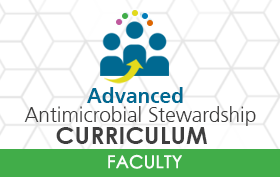
Introduction: Advanced AS Curriculum (Faculty)
The IDSA Advanced Antimicrobial Stewardship (AS) curriculum provides fellows or stewards-in-training with the knowledge and skills to become leaders in antimicrobial stewardship and is intended for those who are considering or actively pursuing a career in antimicrobial stewardship. It builds upon the IDSA CORE AS Curriculum, which provides fellows with a broad foundation in antimicrobial stewardship.
As with the CORE curriculum, the Advanced curriculum is designed for use at the fellow’s home institution and builds on local AS resources. The content is organized into 5 main sections and includes eLearning modules, workbooks, and application activities.
Introduction: Advanced AS Curriculum (Approximately 30 minutes to complete)
Section 1: ASP Development & Logistics (Approximately 2 hours to complete)
Section 2: Antimicrobial Stewardship Operations (Approximately 3 hours to complete)
Section 3: Persuasive Communication in Stewardship (Approximately 2 hours to complete)
Section 4: Specialty Stewardship (Approximately 3 hours to complete)
Section 5: ASP Resources & Professional Development (Approximately 3 hours to complete)
Ideally, Section 1 should be completed first. The other sections can be completed in an order and interval that best fits into the existing ID training program’s educational structure.
Target Audience
Program Directors, Antimicrobial Stewardship Faculty Champions, and additional Faculty responsible for leading and implementing the Advanced AS Curriculum.
Learning Objectives
Upon completion of this curriculum, stewards- in- training will be able to:
- Develop a comprehensive antimicrobial stewardship program by defining overall goals, optimizing team structure, and carrying out regulatory and reporting aspects of stewardship
- Analyze local microbiology and antimicrobial data and use it to identify and implement impactful antimicrobial stewardship initiatives
- Apply behavioral psychology principles and leverage business principles to increase resources for antimicrobial stewardship and influence culture change by creating effective programmatic antimicrobial stewardship communication approaches
- Evaluate and plan the most effective diagnostic and antibiotic stewardship interventions for unique populations and settings (specifically the emergency department, immunocompromised populations, long-term care facilities, and outpatient sites)
- Identify resources for professional development in antimicrobial stewardship to be able to begin a career in antimicrobial stewardship
- Develop a plan to expand the reach of a stewardship program into the outpatient setting and effectively collaborate with OPAT programs to optimize stewardship efforts
Advanced AS Curriculum Workgroup COI Summary Reviewed April 2017 by Rachel Simmons, MD No conflicts found
| Name | Individual's Role in Activity | Name of Commercial Interest | Nature of Relationship |
|---|---|---|---|
| Advani, Sonali | Workgroup member | None | |
| Amstrong, Wendy | Workgroup member | None | |
| Barsoumian, Alice | Workgroup member | None | |
| Beeler, Cole | Workgroup member | None | |
| Bryson - Cahn, Chloe | Workgroup member | None | |
| Cherabuddi, Kartik | Workgroup member | Gatorade | Start - up Research Fund |
| NIH (Medimmune) | Research Grant | ||
| Cohen, Seth | Workgroup member | None | |
| Hamilton, Keith | Workgroup member | None | |
| Holubar, Marisa | Workgroup member | None | |
| Huang, Misha | Workgroup member | None | |
| Ince, Dilek | Workgroup member | None | |
| Justo, Julie Ann | Workgroup member | None | |
| Lee, Matthew | Workgroup member | None | |
| Logan, Ashleigh | Staff | None | |
| Luther, Vera | Workgroup member | None | |
| MacDougal, Conan | Workgroup member | None | |
| Nori, Priya | Workgroup member | None | |
| Ohl, Christopher | Workgroup member | Paratek | Advisory/Consultant Role |
| Patel, Payal | Workgroup member | None | |
| Pottinger, Paul | Workgroup member | McGraw Hill, Elsevier | Honoraria |
| Schooneveld, Trevor | Workgroup member | BioMerieux | Advisory/Consultant Role |
| Rebiotix, Merk | Research Grant | ||
| Insmed | Consulting | ||
| Schwartz, Brian | Workgroup member | None | |
| Spicer, Jennifer | Workgroup member | None | |
| Stack, Conor | Workgroup member | None | |
| Zhou, Yuan | Workgroup member | None | |
| Shnekendorf, Rachel | Staff | None |

 Facebook
Facebook X
X LinkedIn
LinkedIn Forward
Forward